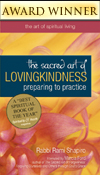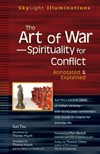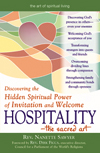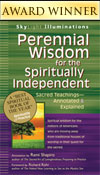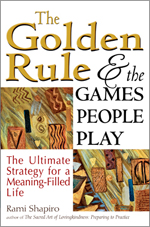This philosophical game changer looks critically at the Golden Rule in the context of game theory to see where it works and where it doesn’t, when it is applicable and when it isn’t. It shows you why knowing the difference can offer you a powerful way to transform your life from one driven by fear to one driven by love.
Rami Shapiro
Quality Paperback
6 x 9, 176 pp | 978-1-59473-598-1
Does the Golden Rule matter?
It depends on the game.
“We have to shift the game before we can promote the Rule. This is why teaching morality alone is insufficient. Educating our children in the Golden Rule without teaching about finite and infinite games and zero-sum and nonzero worldviews is a waste of time. Doing so would be like teaching them the rules of chess while insisting they play only checkers.”
—from Chapter 10, “Play Different”
This provocative and challenging exploration of the Golden Rule, widely accepted as humanity’s moral true north, neither praises the Rule uncritically nor naively insists that it is applicable in every situation. Rather, it looks critically at the Rule in the context of game theory to see where it works and where it doesn’t, when it is applicable and when it isn’t. It shows you why knowing the difference can offer you a powerful way to transform your life from one driven by fear to one driven by love.
This philosophical game changer is written for people of all faiths or none who praise the Rule and yet violate it over and over again. It invites you into the fascinating world of ethical decision making in a way that helps you use the Golden Rule as a fulcrum for shifting your life from often unethical competition to compassionate and even loving cooperation.
“Brilliantly clear, easy to read, well-informed in relevant science, philosophy and religion ... a real contribution to our understanding of the Golden Rule.”
—Jeffrey Wattles, author, The Golden Rule; associate professor of philosophy, Kent State University
“The Golden Rule may not be golden for the reasons you think! In this provocative book, Rabbi Rami leads us to a life of ‘infinite play,’ where the outcome of the game is a gorgeous paradox: everyone wins.”
—Mirabai Starr, author, God of Love: A Guide to the Heart of Judaism, Christianity and Islam and Caravan of No Despair: A Memoir of Loss and Transformation
“Intriguing.... Reverently considering scripture from a multitude of spiritual traditions while at the same time stripping the Golden Rule of its religious trappings, [it] calls and challenges us to live in the truly golden nonzero sum world of interdependence.”
—Steven Greenebaum, author, Practical Interfaith: How to Find Our Common Humanity as We Celebrate Diversity
“Provides a fresh look at the substance of the Golden Rule that has the potential to make it far more accessible and useful.”
—Pastor Don Mackenzie, coauthor, Getting to the Heart of Interfaith:
The Eye-Opening, Hope-Filled Friendship of a Pastor, a Rabbi and an Imam
“[Does] all of us a big favor: help[s] us understand why we humans and our religions have so often failed in our practice of the Golden Rule, and give[s] us invaluable insights and practical tools to make the Golden Rule a lived reality.”
—Paul McKenna, coordinator, Scarboro Missions Interfaith Department
“Shapiro has an important message: either we play the game of life by trying to win at the expense of others (in which case we’ll likely all suffer) or we try to cooperate and treat others as we want to be treated (in which case we may all end up winning).”
—Harry J. Gensler, author, Ethics and the Golden Rule; professor of philosophy, Loyola University Chicago
Why write a book on the Golden Rule?
Every religion has a version of the Golden Rule, yet every religion violates the Golden Rule when it is in the religion’s best interest to do so. Similarly, almost everyone reveres the Golden Rule in the abstract, and yet continually violates it in practice. I wanted to know why.
What did you find out?
I discovered that people play two kinds of games, or engage in two categories of interaction: finite zero-sum games and infinite nonzero games. The point of a finite zero-sum game is to end the game by defeating one’s opponent. The point of infinite nonzero games is to keep the game going by acting in ways that benefit all players and thus motivate them to continue playing. The Golden Rule doesn’t work when playing finite zero-sum games, and yet it is the ultimate guide when playing infinite nonzero games.
Are religions infinite nonzero games or finite zero-sum games?
They are both. When a religion focuses on the welfare of all beings it tends to play an infinite nonzero game and to follow the Golden Rule as the best guide for doing so. When a religion divides people into competing camps—the chosen and the non-chosen, the saved and damned, the believer and the infidel, the high caste and the low caste, etc.—and focuses on the privileged group winning at the expense of the others, it sees the Golden Rule as an impediment to winning and ultimately violates it.
What value does the Golden Rule have in our ordinary lives?
The Golden Rule is helpful in two ways. First, it tells us how best to play infinite nonzero games—the games that provide us with love, meaning, purpose and joy. Second, it points out when we are playing finite zero-sum games and provides us with an opportunity to evaluate the necessity of such a game, and to change it if necessary.
Should people stop playing finite zero-sum games?
Not at all. We should simply limit them to arenas were such competition makes sense: in sports, for example.
What can people expect to gain from reading this book?
Three things: an understanding of the games people play, a way to determine which game they may be playing in different aspects of their own lives, and a guide, the Golden Rule, for playing the most important games—infinite nonzero games—in a manner that enriches their lives and the lives of those they love.
Introduction
- When have you found the Golden Rule applicable to your life, and when have you found it impractical?
Chapter One: The Games People Play: An Introduction to Game Theory
- What relationships in your life fall under the category of finite zero-sum games?
- What relationships in your life fall under the category of infinite nonzero games?
Chapter Two: Warning: The Golden Rule May Be Hazardous to Your Faith
- Being as honest with yourself as you can, ask yourself which beliefs that you hold divide you from others or even pit you against them.
- Being as honest with yourself as you can, ask yourself what beliefs you hold that open your heart to others.
Chapter Three: Evading the Rule in Hinduism, Buddhism and Confucianism
- Being as honest with yourself as you can, ask yourself when you have deliberately gone against the Golden Rule.
- What were your reasons for doing so?
Chapter Four: Evading the Rule in Judaism, Christianity, and Islam
- Taking a hard look at your religious or spiritual beliefs, identify instances where they violate the Golden Rule.
- What would you have to change about those beliefs to act in harmony with the Golden Rule?
Chapter Five: What Have We Learned? Is God Necessary for Morality?
- In your opinion, is something good because God says it is good, or can something be good in and of itself even if there is no God?
- What is the God of your understanding? Why do you believe what you believe?
Chapter Six: What’s Love Got to Do with It? The Golden Rule and Reciprocity
- What is your goal in a loving relationship?
- How do you cultivate love in your relationships?
Chapter Seven: Who Am I? The Golden Rule and the Nature of Self
- What is your gut reaction to the notion that God is that “in whom you live, and move and have your being” (Acts 17:28)?
- Do you feel more comfortable with the notion of you being apart from God or a part of God? Why do you think this is?
Chapter Eight: To Do or Not to Do: The Golden Rule and Free Agency
- In what ways are you in control of your life? In what ways are you not in control?
- Free will requires that there is a part of you that is beyond the conditioning of nature and nurture. Do you have a sense of this free-agent self?
Chapter Nine: Living the Rule: Toward a Global Ethic
- Thinking of compassion as a circle, share who is inside and who is outside your circle.
- If all religions taught the Golden Rule and how to live in a predominately infinite nonzero world, would it still matter which religion a person chose? If nonreligious philosophies taught the same thing, would it matter to you whether a person was religious or not?
Chapter Ten: Play Different: Shifting the Game
- Which of your relationships would you like to move from finite to infinite and zero-sum to nonzero?
- What are the first things you might do to accomplish this shift?

